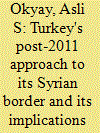| Srl | Item |
| 1 |
ID:
108694


|
|
|
|
|
| Publication |
2009.
|
| Summary/Abstract |
The aim of this article is to look at the political implications of identity patterns in one case that is of exceptional interest, that of Spain. It begins by looking at the nature of identity, and the challenges it poses in the contemporary world. This is followed by a section examining the issue of collective identity in the Spanish context, exploring variation in forms of regional identity and relating this to new political structures in the regions. The two last sections look respectively at the manner in which the regional party systems reflect diverse patterns of identity and the challenges posed by these patterns for the system of government.
|
|
|
|
|
|
|
|
|
|
|
|
|
|
|
|
| 2 |
ID:
153867


|
|
|
|
|
| Summary/Abstract |
This article examines the implications of the post-2011 conflict in Syria for the relationship between Turkey's shifting border politics and its domestic politics, focusing on the period until mid-2015. The analysis demonstrates that two factors explain the shifts in Turkey's border management modalities in this period. These factors were: first, Turkey's aspiration to enhance its regional influence through a power reconfiguration in post-conflict Syria, in which the Assad regime would be replaced by a predominantly Islamist power elite; second, its concern about its territorial integrity and centralized nation-state model, which it tried to safeguard by impeding the emergence of a Kurdish state, or governance structure with increased autonomous powers and expanded territorial control. Power reconfigurations over the course of the conflict and newly arising threats emanating from the neighbouring civil war also had significant implications for Turkey's border management patterns. Embedded within a highly interconnected region that has also been increasingly structured in ethno-sectarian terms, instrumentally shifting border politics gave rise to a high degree of contestation in the domestic sphere, and contributed to the reinforcement of ethnic and sectarian identity boundaries permeating society and politics in Turkey. The case of Turkey is significant in understanding the overall impact of the post-2011 political transition processes in the Middle East and North Africa (MENA) on border politics, on the degree of interdependence between domestic and international politics, on the links between state borders and identity boundaries, and on state-society relations.
|
|
|
|
|
|
|
|
|
|
|
|
|
|
|
|